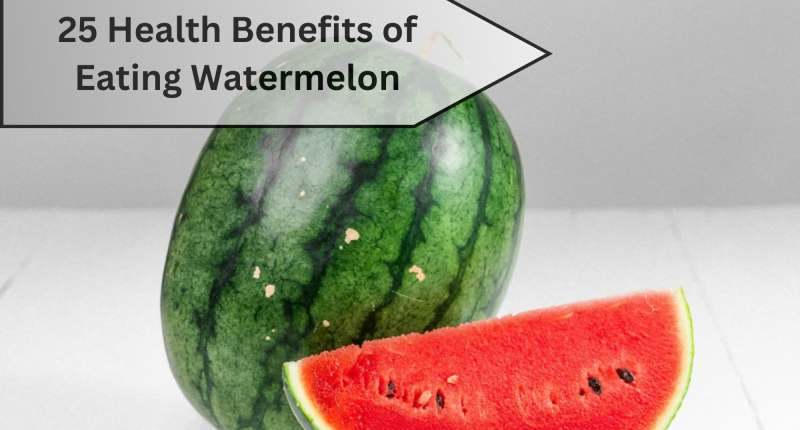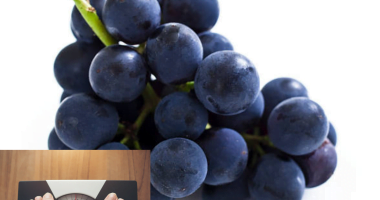Find out the ” 25 Health Benefits of Eating Watermelon” – Watermelon is a refreshing and delicious fruit that is loved by many, especially during the hot summer months. But did you know that watermelon is also packed with numerous health benefits? In this article, we will explore 25 impressive health benefits of eating watermelon.
25 Health Benefits of Eating Watermelon
1. Hydration
Watermelon is 92% water, making it an excellent fruit to consume for hydration. Eating watermelon can help replenish fluids lost through sweating and keep the body hydrated during hot weather.
Put differently, watermelon is mostly made up of water, which can help prevent dehydration and keep the body hydrated. It is also rich in electrolytes such as potassium, which can help regulate fluid balance in the body.
2. Anti-Inflammatory Properties
Watermelon contains anti-inflammatory compounds such as lycopene and vitamin C, which can help reduce inflammation in the body. Chronic inflammation has been linked to various health conditions such as heart disease, arthritis, diabetes, and cancer.
3. Cardiovascular Health
The high levels of lycopene and other antioxidants in watermelon can help reduce the risk of cardiovascular diseases such as heart attacks and strokes. Watermelon can also help lower cholesterol levels and improve blood flow. [1]
4. Digestive Health
Watermelon is rich in fiber, which can help promote regular bowel movements and prevent constipation. The high water content of watermelon can also help soften stools and make them easier to pass.
5. Boosts Immunity
Watermelon is an excellent source of vitamin C, which can help boost the immune system by stimulating the production of white blood cells. White blood cells are responsible for fighting off infections and diseases. Vitamin C is also a powerful antioxidant that can help reduce oxidative stress and inflammation in the body.
6. Skin and Hair Health
The vitamin A and vitamin C in watermelon can help promote healthy skin and hair. Vitamin A is essential for the growth and repair of skin cells, while vitamin C is necessary for the production of collagen, a protein that gives skin its elasticity, i.e Collagen is necessary for the repair and growth of tissues, including skin, hair, and nails.
7. Helps with Weight Loss
Watermelon is a low-calorie fruit that can help with weight loss. It is also rich in fiber, which can help keep you feeling full for longer and prevent overeating.
8. Reduces Muscle Soreness
Watermelon contains an amino acid called citrulline, which can help reduce muscle soreness and improve exercise recovery. Citrulline can also help increase nitric oxide production in the body, which can improve blood flow and enhance athletic performance.
9. Improves Vision
The vitamin A in watermelon can help improve vision and prevent age-related macular degeneration. This condition is the leading cause of blindness in older adults.
10. Anti-Aging Benefits
Watermelon contains antioxidants that can help reduce the signs of aging such as wrinkles, fine lines, and age spots. These antioxidants can also help protect the skin from damage caused by UV rays and pollution.
11. Alleviates Asthma Symptoms
The vitamin C in watermelon can help alleviate asthma symptoms by reducing inflammation and improving lung function. It can also help prevent respiratory infections that can trigger asthma attacks.
12. Reduces Blood Pressure
Watermelon contains compounds that can help lower blood pressure, such as citrulline and arginine. These compounds can help relax blood vessels and improve blood flow, reducing the risk of hypertension and other cardiovascular diseases. [2]
13. Prevents Kidney Stones
Watermelon is a natural diuretic that can help increase urine production and prevent the formation of kidney stones. It can also help flush out toxins and waste products from the body.
14. Regulates Blood Sugar Levels
Watermelon has a low glycemic index, which means it can help regulate blood sugar levels and prevent spikes in insulin. This makes it a suitable fruit for people with diabetes or those at risk of developing the condition.
15. Anti-Cancer Properties
The high levels of antioxidants in watermelon can help prevent cancer by protecting the body from oxidative stress and inflammation. Watermelon can also help inhibit the growth of cancer cells and prevent the formation of tumors.[3]
16. Promotes Wound Healing
The vitamin C and vitamin A in watermelon can help promote wound healing by stimulating collagen production and reducing inflammation. Collagen is necessary for the repair and growth of tissues, including skin, muscles, and bones.
17. Boosts Energy Levels
Watermelon contains natural sugars such as fructose and glucose, which can provide a quick burst of energy. It is also rich in electrolytes such as potassium, which can help regulate fluid balance and prevent dehydration.
18. Reduces Stress and Anxiety
Watermelon contains a compound called lycopene, which can help reduce stress and anxiety by regulating the production of cortisol, a stress hormone. It can also help improve mood and promote relaxation.
19. Supports Bone Health
Watermelon is a good source of calcium, which is essential for strong bones and teeth. It also contains potassium and magnesium, which can help prevent bone loss and improve bone density.
20. Enhances Brain Function
The antioxidants and vitamins in watermelon can help enhance brain function and prevent cognitive decline. Watermelon can also help improve memory and concentration.
21. Reduces Risk of Macular Degeneration
The vitamin C and vitamin A in watermelon can help reduce the risk of macular degeneration, a condition that causes vision loss in older adults.
22. Improves Male Fertility
Watermelon contains citrulline, which can help improve erectile function in men by increasing blood flow to the penis. It can also help improve sperm quality and motility.
23. May Improve Sleep Quality
Watermelon contains compounds that can help improve sleep quality, such as magnesium and potassium. These minerals can help promote relaxation and reduce muscle tension.
24. Enhances Exercise Performance
Watermelon can help enhance exercise performance due to its high content of citrulline. Citrulline can help increase nitric oxide production, which can improve blood flow to the muscles and reduce muscle soreness. This can lead to better endurance and performance during physical activity.
25. Supports Heart Health
Watermelon contains compounds that can help improve heart health, such as lycopene and beta-carotene. These compounds can help reduce the risk of heart disease by reducing inflammation and improving blood lipid levels.
Also read | 4 Reasons Why 12 -1PM Is The Best Time To Eat Watermelon
Nutritional Content of Watermelon
Watermelon is a low-calorie fruit that is high in vitamins, minerals, and antioxidants. It is a good source of vitamin C, vitamin A, potassium, and magnesium. Watermelon also contains lycopene, a powerful antioxidant that gives the fruit its pink-red color.
One cup of diced watermelon (152 grams) contains:
- Calories: 46
- Carbohydrates: 12 grams
- Fiber: 1 gram
- Protein: 1 gram
- Fat: 0 grams
- Vitamin C: 21% of the Daily Value (DV)
- Vitamin A: 18% of the DV
- Potassium: 5% of the DV
- Magnesium: 4% of the DV
- Lycopene: 12.5 milligrams [4]
Conclusion
In conclusion, watermelon is a nutritious and delicious fruit that offers numerous health benefits. From improving heart health to promoting healthy skin and hair, watermelon is a great addition to any diet. Its high water content and natural sugars make it a great choice for hydration and energy, while its anti-inflammatory and antioxidant properties can help reduce the risk of chronic diseases. So, next time you’re looking for a healthy snack or dessert, reach for a slice of juicy watermelon!
Frequently Asked Questions
A: While watermelon is generally safe to eat, consuming excessive amounts can cause digestive issues such as bloating and diarrhea. It is also high in natural sugars, so moderation is key.
A: Yes, the watermelon rind is safe to eat and contains nutrients such as citrulline and vitamin C. It can be pickled, stir-fried, or blended into smoothies.
A: Look for a watermelon that is symmetrical, firm, and heavy for its size. Tap it lightly and listen for a hollow sound, which indicates ripeness.
A: Yes, watermelon is low in calories and high in fiber, which can help with weight loss by keeping you feeling full for longer and preventing overeating.
A: Yes, watermelon contains citrulline, which can help improve erectile function in men by increasing blood flow to the penis.








